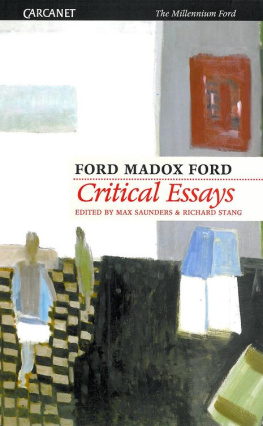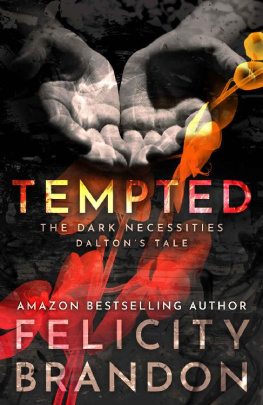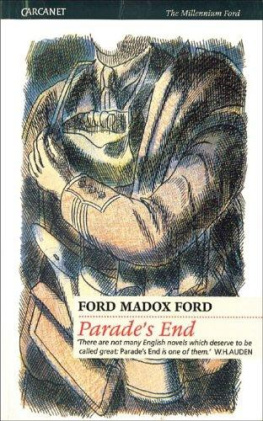Ford Joseph Brandon - Sorokin and Civilization : a Centennial Assessment
Here you can read online Ford Joseph Brandon - Sorokin and Civilization : a Centennial Assessment full text of the book (entire story) in english for free. Download pdf and epub, get meaning, cover and reviews about this ebook. City: Somerset, United States., year: 2017, publisher: Routledge, genre: Politics. Description of the work, (preface) as well as reviews are available. Best literature library LitArk.com created for fans of good reading and offers a wide selection of genres:
Romance novel
Science fiction
Adventure
Detective
Science
History
Home and family
Prose
Art
Politics
Computer
Non-fiction
Religion
Business
Children
Humor
Choose a favorite category and find really read worthwhile books. Enjoy immersion in the world of imagination, feel the emotions of the characters or learn something new for yourself, make an fascinating discovery.

- Book:Sorokin and Civilization : a Centennial Assessment
- Author:
- Publisher:Routledge
- Genre:
- Year:2017
- City:Somerset, United States.
- Rating:5 / 5
- Favourites:Add to favourites
- Your mark:
- 100
- 1
- 2
- 3
- 4
- 5
Sorokin and Civilization : a Centennial Assessment: summary, description and annotation
We offer to read an annotation, description, summary or preface (depends on what the author of the book "Sorokin and Civilization : a Centennial Assessment" wrote himself). If you haven't found the necessary information about the book — write in the comments, we will try to find it.
Sorokin and Civilization : a Centennial Assessment — read online for free the complete book (whole text) full work
Below is the text of the book, divided by pages. System saving the place of the last page read, allows you to conveniently read the book "Sorokin and Civilization : a Centennial Assessment" online for free, without having to search again every time where you left off. Put a bookmark, and you can go to the page where you finished reading at any time.
Font size:
Interval:
Bookmark:

CIVILIZATION
First published 1996 by Transaction Publishers
Published 2017 by Routledge
2 Park Square, Milton Park, Abingdon, Oxon OX14 4RN
711 Third Avenue, New York, NY 10017, USA
Routledge is an imprint of the Taylor & Francis Group, an informa business
All rights reserved. No part of this book may be reprinted or reproduced or utilised in any form or by any electronic, mechanical, or other means, now known or hereafter invented, including photocopying and recording, or in any information storage or retrieval system, without permission in writing from the publishers.
Notice:
Product or corporate names may be trademarks or registered trademarks, and are used only for identification and explanation without intent to infringe.
Library of Congress Catalog Number: 95-48967
Sorokin and civilization : a centennial assessment / edited by Joseph B. Ford, Michel P. Richard, and Palmer C. Talbutt ; with a preface by Roger W. Wescott.
p. cm.
Festschrift for Pitirim Sorokin.
Includes bibliographical references and index.
ISBN 1-56000-247-6 (alk. paper)
1. Sorokin, Pitirim Aleksandrovich, 1889-1968. 2. SociologistsUnited StatesBiography. 3. SociologyUnited States. I. Ford, Joseph B. (Joseph Brandon) II. Richard, Michel Paul, 1933- . III. Talbutt, Palmer, 1927- . IV. Sorokin, Pitirim HM22.U6S6385 1995
301.092dc20 95-48967
[B] CIP
ISBN 13: 978-1-56000-247-5 (hbk)
Roger Williams Wescott
This volume has been long in gestation. It began in the spring of 1987, when Palmer Talbutt, then Associate Professor of Philosophy at Virginia Polytechnic Institute and State University, sent a proposal to Michael Palencia-Roth, then President of the International Society for the Comparative Study of Civilizations. Talbutt suggested that a festschrift be prepared under the sponsorship of I.S.C.S.C. to honor the Societys founding President, Pitirim Alexandrovich Sorokin, on the occasion of Sorokins centennial in 1989. Dr. Talbutts proposal was based on close consultation with Joseph Brandon Ford, Emeritus Professor of Sociology at California State University at Northridge, who had known Sorokin personally and had given the memorial address for Sorokin at the International Congress of Sociology in Rome, Italy, in 1969. The proposal was referred by President Palencia-Roth to the I.S.C.S.C. Council, which approved sponsorship of the project.
In 1988, 1989, and 1990, special sessions on Sorokins work were held at I.S.C.S.C. conferences, chiefly due to the organizational efforts of Ford and Talbutt. At these meetings, early drafts of many of the papers in this volume were presented and discussed. Encouraged by these results, Talbutt approached Michel Paul Richard, then Associate Professor of Sociology at the State University of New York at Geneseo. Richard was also extremely knowledgeable about Sorokin, having written the introduction to the one-volume edition of Social and Cultural Dynamics that was published by Transaction. Talbutt, Ford, and Richard agreed to blend their talents and co-edit the prospective volume.
The three editors talked with prospective contributors and worked to develop a plan for integrating the diverse materials in a single volume. This was a complex task that required decisions on such issues as whether all papers had to be original works written for the occasion, whether individual contributors could submit more than one article, how to group the papers under appropriate subject headings, whether there should be editorial introductions to sections of the festschrift, and how to locate an interested publisher.
By 1992, a large amount of material had been submitted by Sorokin scholars, and a great deal of work had been done by the editors, each of whom contributed in important and distinctive ways. Michel Richard assumed the burdens of manuscript preparation, scrutinizing individual papers for formats, references, and an infinity of other details, while holding authors to deadlines. Ford and Talbutt continued to contribute valuable insights and advice, based on their reading of submitted papers.
It gradually became apparent, however, that serious differences among the editors about the shape and content of the festschrift were slowing progress. In an effort to get the work moving again, I then appointed a Sorokin Project Committee. It consisted of Barry V. Johnston, Professor of Sociology at Indiana University Northwest; Matthew Melko, Past President of the I.S.C.S.C. and Professor of Sociology at Wright State University; and Lawrence T. Nichols, Associate Professor of Sociology at West Virginia University. The committee, chaired by Dr. Nichols, made recommendations for reconciling differences and resolving the impasse. On this basis, I asked Dr. Johnston to begin preparation of the final manuscript for submission to Transaction. He and Dr. Nichols collaborated on this project. Copy editing was completed and an index was added by Dr. Nichols.
I met Sorokin only once, following a lecture he gave at Michigan State University. But when, shortly afterward, I heard of his election as the first president of the I.S.C.S.C., I wrote to congratulate him and solicit membership in the Society. In response, he kindly referred me to the I.S.C.S.C. secretariat in Salzburg, Austria. He later included a brief contribution of mine in his Sociological Theories of Today. These few contacts, however minor, were important to me, and they have strengthened my determination that the I.S.C.S.C. Sorokin Project should not be permitted to languish but should, on the contrary, issue in a publication in which we could all take pride.
Sorokin was a marginal man in several different senses. Ethnically, he was half Russian and half Komi. Though his father was a Russian goldsmith, his mother was a member of a small Uralic community of agricultural, fishing, and farming folk, linguistically closer to the Finns and Estonians than to any of the Slavic or Germanic peoples. Politically, he had been alienated from the Czarist autocracy. And, despite his participation in the short-lived Kerensky government, he was soon equally alienated from the Leninist regime that succeeded it. Intellectually, he early found himself out of step with the sociological functionalism and the technocratic scientism that increasingly dominated Harvard in the 1940s and 1950s. While some academic colleagues regarded him as a socio-astrologist, he characterized many of them as Lilliputian fact-finders and their statistics as numerology. Yet there is one major advantage to being marginal, in whatever context one finds oneself. That is the detached perspective that permits the marginalized individual to avoid being ideologically swamped by a consensus so pervasive as to become subliminal. Sorokins marginality allowed him to maintain a critical distance from the theoretical fashions impinging on him both in Europe and in America.
Sorokin should not be regarded, however, merely as a stubborn eccentric, stoutly resistant to the ideas of his contemporaries. His moral concerns and spiritual aspirations resonated with those of the rural populations of the world, whom the self-consciously modern intelligentsia of urban centers were often unable either to understand or to sympathize with. His principled dissent frequently anticipated that of Charles Wright Mills, Alfred McClung Lee, and Alexander Solzhenitsyn.
Sorokin, moreover, was a giant on the twentieth-century stage. He debated with Trotsky, exchanged ideas with Pavlov, and received a personal invitation to meet with President Masaryk of Czechoslovakia. He was, to paraphrase Joseph Ford, a scholar among statesmen and a statesman among scholars. To ignore him is to risk parochialism. To acknowledge his stature, on the other hand, is to exhibit the ecumenism that we consider a hallmark of our Society.
Font size:
Interval:
Bookmark:
Similar books «Sorokin and Civilization : a Centennial Assessment»
Look at similar books to Sorokin and Civilization : a Centennial Assessment. We have selected literature similar in name and meaning in the hope of providing readers with more options to find new, interesting, not yet read works.
Discussion, reviews of the book Sorokin and Civilization : a Centennial Assessment and just readers' own opinions. Leave your comments, write what you think about the work, its meaning or the main characters. Specify what exactly you liked and what you didn't like, and why you think so.






